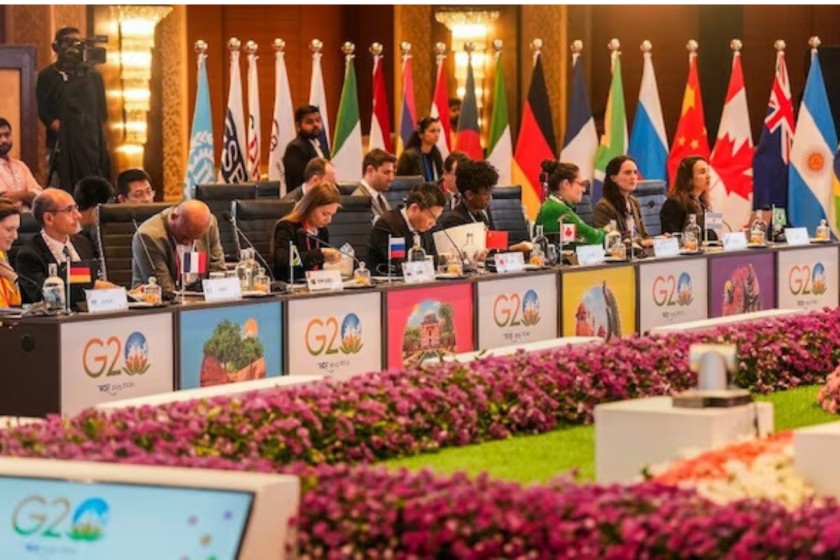- September 8, 2023
Transforming global finance under India’s G20 presidency

In a changing world, the G20 summit hosted by PM Modi carries immense significance for global economic cooperation.
On 9 and 10 September, Prime Minister Shri Narendra Modi hosts the G20 leaders’ summit in New Delhi. Indonesia handed over the presidency to India on 1 December 2022 and Brazil’s presidency will start on 1 December 2023. While each presidency establishes its own agenda, continuity is maintained through the mechanism of a troika where past, present and future presidencies coordinate closely in meetings throughout the year. The fact that the troika centred on India includes two large emerging markets, Indonesia and Brazil, is significant for global finance.
Since the 2009 Toronto summit, successive G20 presidencies have declared that the main justification for the G20 (as a self-selected, non-representative entity) is for the leaders of the world’s large economies to provide the political underpinning for ‘strong, sustainable, balanced and inclusive’ economic growth at both national and global levels.
As the world settles down from the disruptions created by Covid-19, India has deployed its G20 presidency to revive this shared ambition in an extremely challenging economic and geopolitical environment. To understand better the ambitions of India’s presidency, it is worth briefly recalling the origins of the G20 leaders’ summit process in 2008.
Following the failure of Lehman Brothers, financial markets on both sides of the Atlantic were in free-fall. The US was in an awkward transition between the outgoing president, George W Bush, and President-elect Barack Obama. The G7 leaders invited members of an existing ministerial-level G20 (meeting since 1999) to convene at the head-of-government-level. This was widely seen as a device to enlist co-operative behaviour by China, already by then a major force in global trade and finance.
The London summit of May 2009 provided proof of the willingness to co-operate in a crisis and helped calm markets. At that time there was optimism about the prospects for inclusive global growth and the prospects for convergence across countries, although in-country inequality was already an issue, particularly in the US.
Technology was seen as a largely benign force. World trade was booming. The world was enjoying a peace dividend. Conditions were conducive for collective action, although even then pre-emptive action to deal with global imbalances (promoted by the International Monetary Fund) did not find favour till the crisis broke.
The fragility of their financial sectors in the 2008 crisis came as a major shock to the G7 countries, particularly as it was closely followed by the euro crisis. Accordingly, the early activity of the G20 was less about restoring growth and more about insulating the G7 economies from further risks to their financial sectors.
As India looks at the world 15 years later, the shoe is very much on the other foot. Many developing countries are struggling with unsustainable debt, while trying to ensure food and energy security for their people. India, as the G20 chair, sees itself as representing the interests of member countries that belong to the global South and has proposed membership for the African Union, in the way that the European Union is a full member of the G20.
While India has had the scale and autonomy to bounce back relatively quickly from Covid-19, this is not true of most countries of the global South. Development momentum has appreciably deteriorated because of Covid-19, and this has been further complicated by the aftershocks of war, sanctions and inflation. The challenges of adapting to a changing climate adds to economic and social stress. There is a deep crisis of economic development, well-documented in the stagnation of the sustainable development goals of the United Nations and in commentary by the IMF and the World Bank.
But due to changing geopolitics, this deep crisis has not evoked the solidarity of the past. In supporting the revival of growth in the global South through the G20’s finance track, India’s focus has been on making the multilateral development bank system fit for current challenges and addressing debt issues for low-income countries within the common framework of the IMF.
There is increasing empirical research, from official bodies such as the Bank for International Settlements, European Central Bank and from respected academics (such as Helene Rey of the London Business School) of a clear global financial cycle largely driven by monetary policy decisions of the major metropolitan central banks, notably the US Federal Reserve. This cycle has a discernible effect on portfolio flows in and out of emerging markets and, increasingly, so-called ‘frontier markets.
The existence of such a cycle is of profound importance for development finance because the green transition is capital intensive. Responding to Covid-19 has used debt capacity in most cases, so additional capital will have to come from abroad. Absorbing this capital means higher current account deficits or, in other words, stable capital inflows and a robust global safety net. Expanding the lending capacity of the MDBs only solves part of the problem. The bigger prize is for private capital managed in the North to find its way to high-return projects in the South.
This requires a reimagining of the means and ends of global finance that the G7 presidencies have not chosen to address. India has taken on the MDB initiative from Indonesia after it made a start on the capital adequacy framework. This weekend’s summit may give signals on whether the G7 is willing to go the additional step of exploring a capital increase as recommended by the expert group commissioned by India.
As Brazil takes over from India, given the sophistication and integration of its own capital markets, perhaps it will take on the task of reshaping the skills and talents of private finance to serve the development challenges of a hurting planet.
Suman Bery is Vice Chairman of NITI Aayog, Government of India
